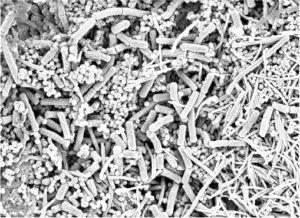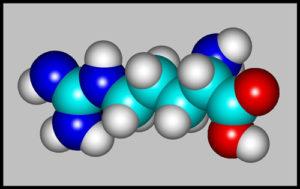Meet dental biofilm:

It’s the sticky goo that bacteria and other microbes form as they colonize on the enamel of your teeth. They learn how to work together and protect each other for the sake of helping the group go on.
When you brush and floss, you destroy these colonies. But tenacious little critters that they are, those microbes that remain – for plenty do, even after thorough cleaning – go right to rebuilding. You can see it for yourself in this great time-lapse film of biofilm forming on clean enamel as human saliva washes over it:
Now meet L-arginine:

L-arginine is a common amino acid – a building block of protein. Our bodies can synthesize it, but we also get it through some of the foods we eat, particularly red meat, fowl, fish and dairy. Fair amounts can be found in spinach, lentils, soy and whole grains, as well.
Arginine plays a role in wound healing, and immune and hormone function. It helps the kidneys remove waste. It appears to support good heart health.
It has dental uses, as well – for instance, as an ingredient in toothpastes and other products designed for sensitive teeth. And now research just published in PLOS One suggests another role for it: destroying biofilm. As DrBicuspid reports,
The researchers conducted a study in which they observed how common oral bacteria flourished among one group of saliva samples, which hadn’t been supplemented with L-arginine, and how it handled another group that had. They found a substantial disintegration of bacteria in the L-arginine group, suggesting possible benefits of putting it in consumer health products such as toothpaste and mouthwash.
* * *
“L-arginine is a building block for life. We’re just changing the concentration, increasing it to high levels,” Rickard explained. “That changes the properties of bioflims and how they interact with the surface of teeth. The biofilms fall off; they can’t maintain their stickiness. It’s kind of cool. Instead of trying to kill microbials, let’s try to instead diassemble them.”
The key, of course, is in the amount of L-arginine they presented to the biofilms – far more than anyone could reasonably get through diet, as if that would even have the same effect. The researchers only studied direct exposure.
Still, it’s always fascinating to see science illuminating the power of naturally occurring substances over synthetic drugs – a reminder of how nature really does get it right.
Biofilm image via the American Dental Hygienist’s Association
L-arginine illustration via Microscopy.UK